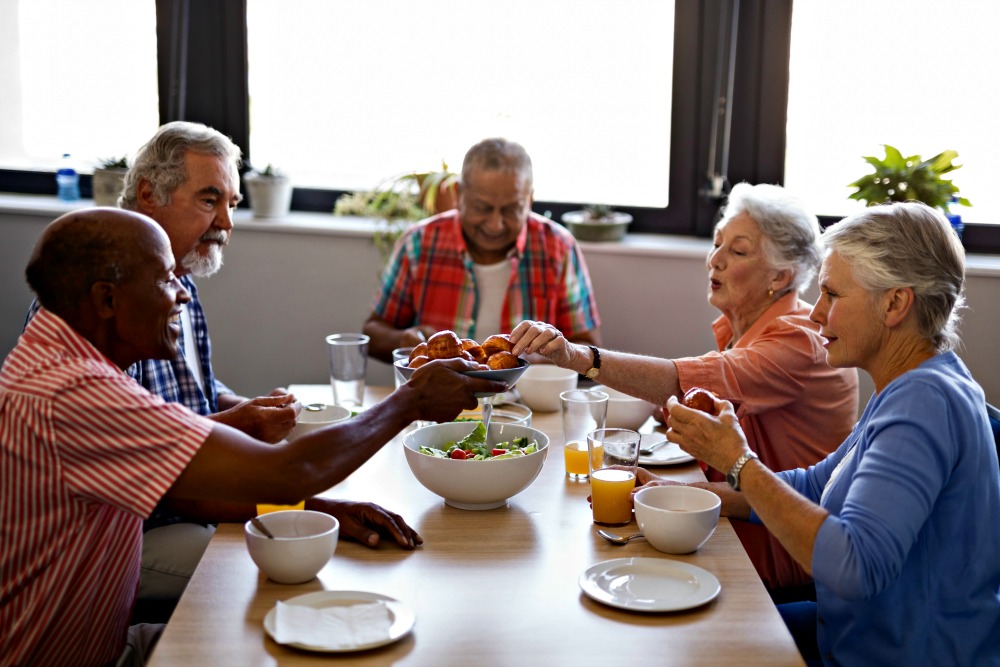Nutrition As We Age—How Our Needs Change

Few things stay the same as we age, and our nutritional needs are no different.
Nutrition as we age plays a key role in our quality of life. As we get older, certain body changes increase the risk of nutritional deficiencies that can affect all areas of health, including physical, mental, and social health.
Providing your body with the right nutrients and maintaining a healthy weight as you get older can help you stay active and independent. It can also help you improve and even prevent symptoms of chronic conditions, like diabetes or heart disease.
Let’s take a look at the ways that our nutritional needs change as we get older—and how caregivers can help their loved ones meet those needs.
Nutrition As We Age: Physical Changes in Seniors
It’s no secret that our bodies change over time. But there are often more changes taking place than meet the eye.
Some of the most notable physical changes in older adults that affect their nutritional needs include:
- slower metabolism
- declining appetite
- less lean body mass
- shrinking bone density
- malabsorption of vitamin B-12
- decreased number of taste buds
So what do these changes mean for older adults and their nutritional needs? In a nutshell, older adults need:
- fewer calories each day
- strategies to increase appetite and boost food intake
- more high-quality protein
- adequate daily amounts of calcium and vitamin D
- more foods fortified with vitamin B-12
- suggestions about different ways to prepare food, such as incorporating various spices
But what does that look like for seniors? That is, what kinds of foods—and how much of those foods—should seniors be consuming?
Nutrition As We Age: Choosing Healthy Foods
Because our nutritional needs change as we get older, the types and quantities of foods we eat will need to change, too.
Choosing healthy foods is key to getting the nutrients you need. And fortunately, figuring out which foods to eat—and how much of them—has gotten easier in recent years.
Gone are the days of the food pyramid guiding our food choices. The USDA now recommends using their relatively new tool, MyPlate, to learn how your plate should look based on your age and other factors.
The AARP has done one even better: The organization specially made a MyPlate for Older Adults.
To ensure you or your aging loved one is getting the necessary nutrients, the Dietary Guidelines suggests choosing foods every day from the following:
- 5 to 7 ounces of a lean protein source, such as lean meats, seafood, eggs, and beans
- A colorful blend of 1.5 to 2.5 cups of fruits and 2 to 3.5 cups of vegetables
- 5 to 10 ounces of whole grains, like brown rice or whole-wheat pasta
- 3 cups of a low-fat dairy source, such as milk
In addition, the Dietary Guidelines recommend no more than 5 to 8 teaspoons of oils—and only “small” amounts of salt, solid fats, and added sugars—each day.
Nutrition As We Age: How Caregivers Can Help Their Aging Loved Ones
It can be hard to make sense of the various nutritional changes as we age. Caregivers can help aging loved ones navigate those changes in a number of ways.
Three key ways that caregivers can ensure their loved one is meeting their nutritional needs include:
- Planning healthy meals—Following the above guidelines, you can make sure that your aging relative is eating the appropriate foods, as well as the right amounts.
- Making meal-time a social event—Meals are a great way to gather with loved ones and socialize. Ask your loved one’s family members or friends over for lunch. Another option is to take advantage of our through-the-door transportation services to take your loved one to the Senior LIFE Center, where members can dine together over provided, senior-friendly meals and snacks.
- Talking with your loved one’s doctor—Because nutritional deficiencies are common among seniors, some need to take vitamins or dietary supplements to ensure they’re getting the necessary daily nutrients. Ask your loved one’s doctor whether vitamins and/or supplements are needed.
Nutrition As We Age: How Senior LIFE Helps Aging Adults Navigate Their Changing Needs
And, finally, caregivers can help their loved ones with their nutritional needs by partnering with our Senior LIFE team.
At Senior LIFE, we understand that it can be hard to make sense of the many different nutritional needs as we age. That’s why we offer nutritional counseling services to help members understand and manage those needs.
Our team of providers is specially trained in the unique dietary needs of seniors. As part of that team, a registered dietitian provides members with nutritional counseling and diet planning, based on their individual needs and medical conditions—such as diabetes and hypertension.
At Senior LIFE, our specially trained team helps members understand their changing dietary needs through nutritional counseling. To learn more about the benefits of the LIFE program or to get started, call the Senior LIFE location nearest to you or 1-877-998-LIFE (5433).
Categories: Wellness Matters

